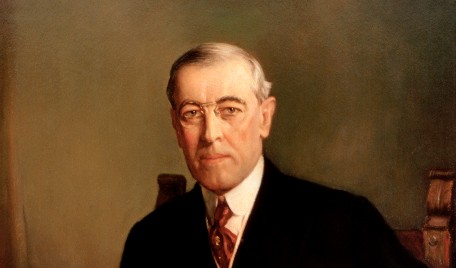On November 15, 1919, a procedure introduced by Woodrow Wilson to the Senate, the cloture rule, backfired on the President as it helped lead to the defeat of a Versailles Treaty he personally negotiated in Paris.
 As an academic, Wilson specialized in study congressional procedures and as President, he soon became frustrated with the practice of using filibusters in the Senate to delay votes.
As an academic, Wilson specialized in study congressional procedures and as President, he soon became frustrated with the practice of using filibusters in the Senate to delay votes.
The filibuster’s origins went back to 1805, when then Vice President Aaron Burr recommended that the Senate drop a rule that limited debates on its floor. By the 1840s the use of the delaying tactic became more common in the Senate, while the House ended its use of filibusters.
However, in 1917 President Wilson grew upset with Senate delays in taking up legislation he supported. On the eve of American participation in World War I, Wilson wanted to arm United States merchant ships after Germany said on March 1, 1917 it would engage in unrestricted submarine warfare on merchant ships in the Atlantic.
Wilson’s measure passed the House but it was defeated by a Progressive-led filibuster in the Senate. On his second inauguration day, March 4, 1917, Wilson issued a statement condemning the Senate and insisting on a cloture rule that would let a two-thirds majority of the Senate end a debate on motions.
“The Senate of the United States is the only legislative body in the world which cannot act when its majority is ready for action. A little group of willful men, representing no opinion but their own, have rendered the great government of the United States helpless and contemptible,” Wilson said. Soon after, on March 8, Rule 22 was added to the Senate lexicon. It allowed for a super-majority vote to end debate, with each Senator having the option to speak for an hour after a successful cloture vote.
Later in 1917, the first two attempts failed in the Senate to invoke cloture, and the tactic wasn’t used in 1918. After the war concluded in 1918, Wilson became one of the architects of the proposed Versailles Treaty and the League of Nations.
President Wilson returned from Paris and personally presented the treaty to the Senate in July 1919 for ratification. It was the first time since 1789 that a President had appeared in the Senate to directly ask for action on a treaty. Wilson, a Democrat, appealed to a Republican-controlled Senate to approve the pact. [The treaty] has come about by no plan of our conceiving, but by the hand of God. We cannot turn back,” he insisted.
In September 1919, Senator Majority Leader Henry Cabot Lodge introduced the treaty for debate on the floor, with 14 reservations added that limited the need for the United States to join a military action called by the League of Nations.
By November, the Senate hadn’t ratified the treaty as three different factions fought over its terms. Even though a filibuster wasn’t underway, a cloture motion was introduced by Senator Gilbert Hitchcock, a Wilson supporter on November 13, and the motion passed by a 78-16 votes two days later.
However, both votes to ratify the Versailles Treaty, with and without Lodge’s reservations, failed on November 19. The Versailles Treaty would come back for another vote in March 1920, only to fail again. One month before the November 1919 cloture vote, Wilson had suffered a stroke and was unable to argue for the treaty’s passage.
Since then, cloture rules have changed to require only 60 Senators to end debate on the floor, and the use of filibusters is limited mostly to matters about legislation. But cloture is now used more often on the Senate floor to limit debate. So far, it has been invoked 62 times in the current 115th Congress.
Scott Bomboy is the editor in chief of the National Constitution Center.







